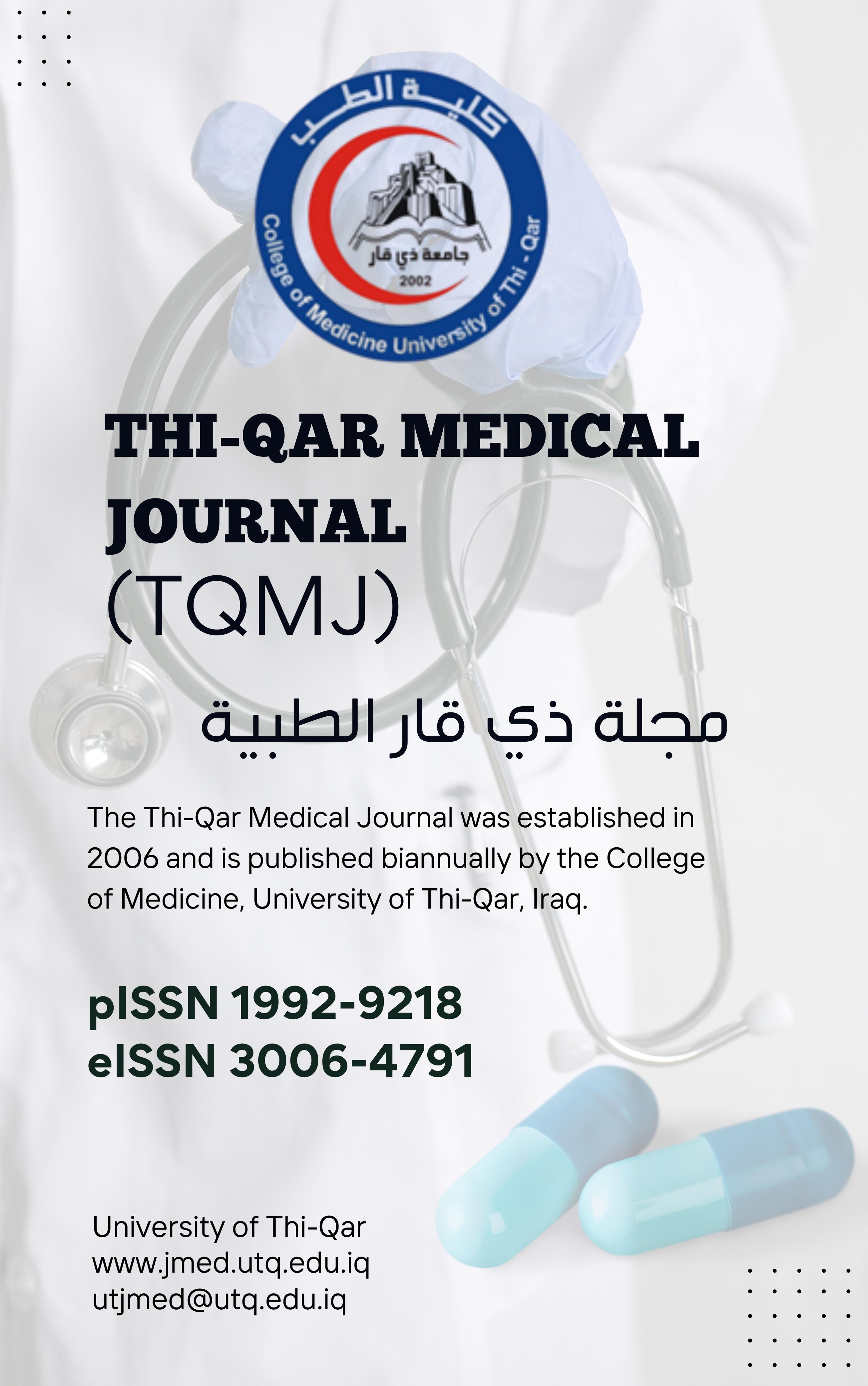Evaluating diabetic nephropathy Severity by the 8-OHDG, AGEs and oxidative stress Biomarkers
DOI:
https://doi.org/10.32792/jmed.2025.29.12Keywords:
Diabetic nephropathy, 8-OHDG, AGEsAbstract
Back groundEnd-stage kidney disease (ESKD) is most commonly caused by diabetic kidney
disease (DKD) in affluent nations, including the US. It is a microvascular
complication that can arise in people with type 1 diabetes (T1DM) or type 2
diabetes (T2DM).Aims of the study: Understanding the connection between
vitamin D and Cytokine levels in diabetic nephropathy patients.Result : The
study's 90 participants (40 women and 50 men) showed a wide variety of ages,
with most of them being between 45 and 82. The study compared the
relationship between diabetic nephropathy and several kidney function
parameters in males and females, showing differences in the levels 8-OHDG,
AGEs and oxidative stress Biomarkers. The comparison of oxidative stress
biomarker (MDA, 8OHDG, AOPP, HNE4 and AGE) between patient and
control groups has been carried out.
Conclusions: It has been observed that the values of kidney efficiency
parameters are affected in diabetic patients after a number of years, and as a
result this leads to an increase in the values of these parameters, which
ultimately leads to kidney damage or severe damage, which makes the people
concerned need to undergo dialysis or even a kidney transplant, or in late cases
it may lead to death.
References
Ye, X., Li, M., Zhang, C., & Chen, Y. (2022). The impact of persistent hyperglycemia on organ
systems: A systematic review. Journal of Diabetes Research, 2022, 1-15.
Mishra, R., Singh, A., & Kumar, A. (2018). Type 1 diabetes: Causes, complications, and management.
Journal of Diabetes & Metabolic Disorders, 17(4), 1-15.
Peters, A., & Laffel, L. (2020). Diabetes management: A global perspective. The Lancet, 398(10297),
-433. https://doi.org/10.1016/S0140-6736(20)31267-9
American Diabetes Association. (2020). Standards of medical care in diabetes—2020. Diabetes Care,
(Suppl. 1), S1-S212. https://doi.org/10.2337/dc20-SINT
Cole, J. B., & Florez, J. C. (2020). Genetics of diabetes mellitus and its complications. Nature
Reviews Nephrology, 16(7), 377-390. https://doi.org/10.1038/s41581-020-0253-4
Tokhirovna, E. G. (2024). Factors influencing secondary diabetes development and management.
Diabetes Therapy, 15, 567-580. https://doi.org/10.1007/s13300-023-0145-0
Alicic, R. Z., Rooney, M. T., & Tuttle, K. R. (2017). Diabetic kidney disease: Challenges, progress,
and possibilities. Clinical Journal of the American Society of Nephrology, 12(12), 2032-2045.
Jin, Y., & Zhang, L. (2024). Mechanisms of diabetic nephropathy: Current insights. Journal of
Nephrology Research, 48(1), 75-90. https://doi.org/10.1177/1470320320973186
Zhao, L., Ma, X., & Li, H. (2023). Advanced glycation end products and their role in diabetic
nephropathy. Frontiers in Endocrinology, 14, 124598.
Yu, M., Tan, X., & Li, Q. (2023). Oxidative stress and renal fibrosis in diabetic nephropathy. Journal
of Cellular Biochemistry, 124(5), 752-761. https://doi.org/10.1002/jcb.30678
Alli, O. (2023). Inflammatory pathways in diabetic nephropathy. Journal of Diabetes Research, 2023, 1-10.
Kriz, W., Löwen, D., & Gröne, H. J. (2023). Glomerular hypertension and proteinuria in diabetic
nephropathy. Kidney International, 103(3), 586-596.
Liu, J., Meng, F., & Wei, Q. (2023). Role of proteinuria in diabetic nephropathy progression.
American Journal of Kidney Diseases, 82(2), 290-301.
Dai, C., & Li, Y. (2019). Pathophysiology of diabetic nephropathy. Diabetes & Metabolic Syndrome, 13(4), 246-255.
Propper, D. J., & Balkwill, F. R. (2022). Harnessing cytokines and chemokines for cancer therapy.
Nature Reviews Clinical Oncology, 19(4), 237–253.
Neurath, M. F. (2024). Strategies for targeting cytokines in inflammatory bowel disease. Nature
Reviews Immunology, 24(8), 559–576.
Sakata, N., et al. (2021). The role of advanced glycation end-products in diabetic nephropathy.
Diabetes Research and Clinical Practice, 172, 108637.
Dandona, P., et al. (2017). Oxidative stress in diabetes: A hallmark of its vascular complications.
Clinical Chemistry, 64(1), 34-47.
Fusar- Poli, et al 2021
Jin, Y., & Zhang, L. (2024). Mechanisms of diabetic nephropathy: Current insights. Journal of
Nephrology Research, 48(1), 75-90. https://doi.org/10.1177/1470320320973186
Downloads
Published
Issue
Section
License
Copyright (c) 2025 Lina A. Naser, Bushra A. M. Abdul Azeez, Ali Jameel Hameed

This work is licensed under a Creative Commons Attribution 4.0 International License.





